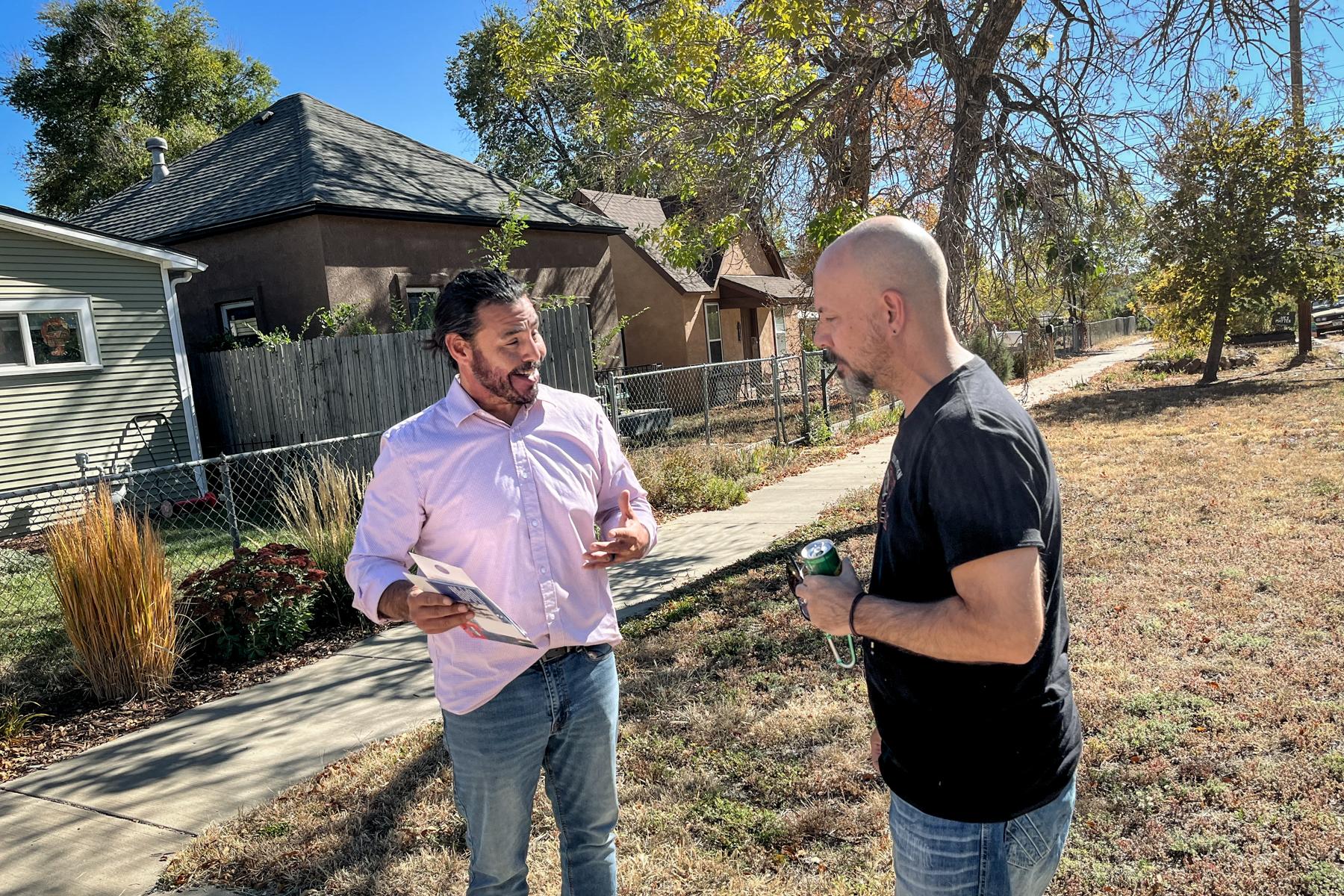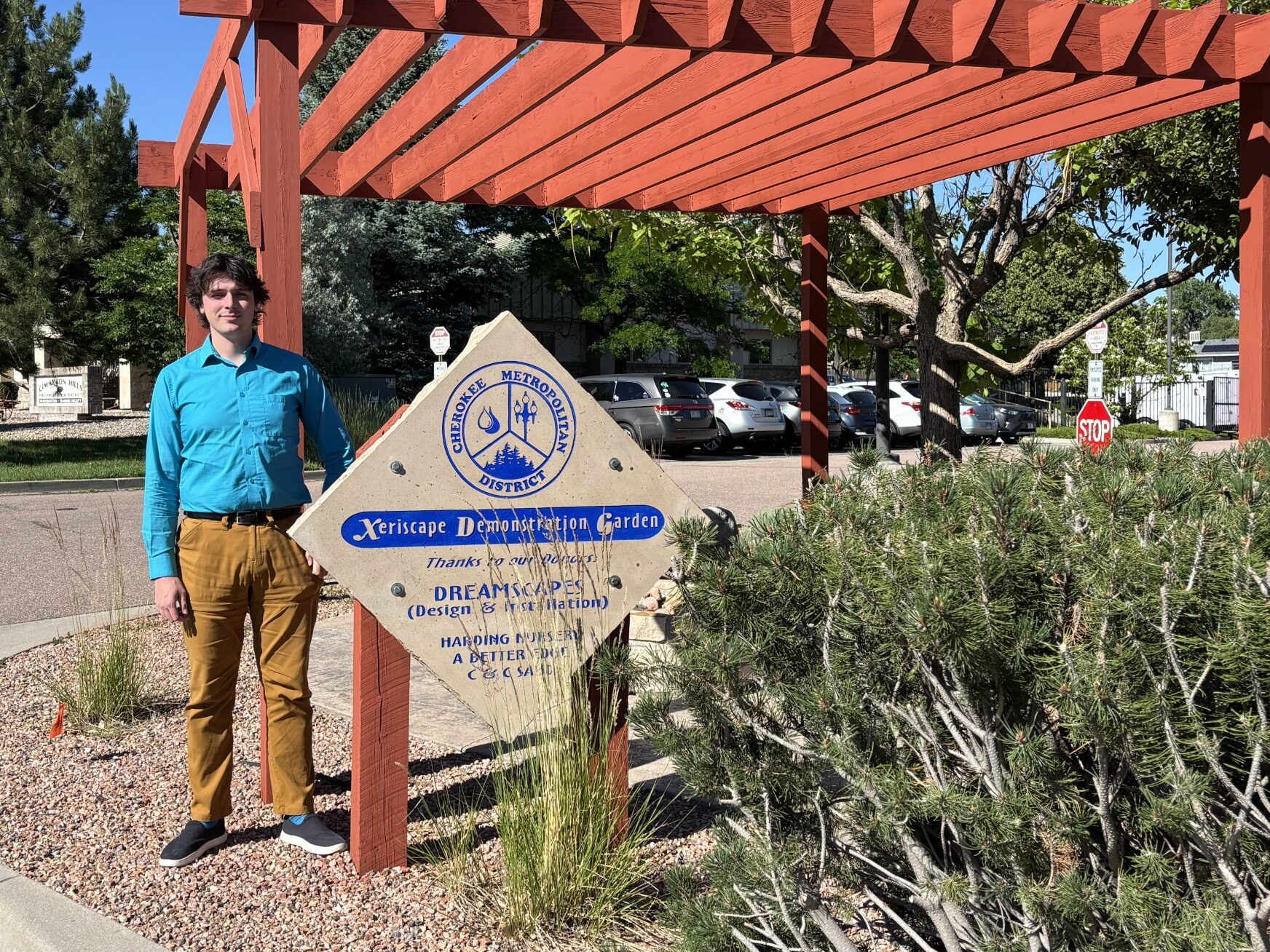
It’s a beautiful fall Saturday in Colorado Springs as congressional candidate David Torres and his small team gather flyers and prepare to pound the pavement to get out the vote. At least, as much as they can in this deep red district.
Torres, a Democrat, is running in Colorado’s 5th Congressional District against Republican incumbent Doug Lamborn. No Democrat has ever held the seat since it was created after the 1970 census and the most recent round of redistricting doesn’t seem likely to change that. The seat currently has a 20-point lean for Republicans.
“‘You’re crazy.’ ‘This is silly.’ ‘People have tried it, they’ve never succeeded,’” Torres recalled people telling him when he started this run. “This wasn't about an easy road for me. This was about my community, and my community is El Paso County … there was no way that if I was going to run for something as important as Congress, that I wouldn't run for my community.”
It’s a mixed bag as he approaches the doors. Often, no one is home and he leaves campaign literature at the door. In a modern twist, if he spots a doorbell video, Torres gives a 15-second pitch to that. The few people he does catch at home are polite when he tells them who he is and encourages them to vote in the 2022 election.
Torres said this is what he loves about the campaign — actually getting out and talking to the people of El Paso County, the place he’s called home since he was 4 years old.
But most people don’t know who Torres is. As with many of the candidates running in what are considered non-competitive races, or the third-party candidates challenging the major parties, he hasn’t gotten much financial help, media coverage or traction in the race.
Running against the odds
It’s a similar story in Congressional District 6, just north of Torres’s district. There, Republican Steven Monahan is candid about the challenges of running for Congress in a solid blue seat.
“People want to ask, ‘Hey why is this not happening, why aren’t you debating?’ Because [Rep. Jason Crow] won’t,” said Monahan. “It doesn't bother me. I'm not offended that people think that it's a lost cause district, or it's all tied up for [the other party]. I believe the American people will change their mind.”
Republican incumbent Doug Lamborn is also not debating in the 5th. In fact, most congressional incumbents are not hitting the debate stage, save Republican Ken Buck in the 4th Congressional District, which has a 25-point Republican lean, and Lauren Boebert, who is in the 3rd District with only a 9-point Republican lean and facing a tougher-than-expected reelection.
Republican consultant Dick Wadhams recalled having some honest conversations as GOP party chair with prospective candidates about running in districts where it’s essentially one-party rule.
“Take a look at the numbers. Know what you’re getting into. Know that that district will never be a priority for either the state party or national Republican entity,” he would warn them.
Still, political scientist Paul DeBell says it’s good for the country that parties push to find and field candidates even in those races.
“Democracy at its essence is political competition … If you have a district with only one option, essentially, that’s a real lack of democratic accountability,” said DeBell, an associate professor at Fort Lewis College.
At its core, elections might be about winning, but DeBell added that an underdog candidate in these lopsided races can still do one thing, win or lose: raise issues for voters.
“You can, as a candidate for office, put pressure upon the incumbent and upon the dominant party in a way that can actually perhaps change their policies or change the way they're talking about things that could be impactful for the broader community,” he said.
A chance to spread a message (and take votes from a major party candidate)
For third-party candidates with less money and institutional backing, running is also an opportunity to get a message out and — potentially — act as a spoiler for one of the major parties.
It’s a role that Brian Peotter, the Libertarian candidate for U.S. Senate, relishes.
“That’s specifically what I’m trying to do. And I’m going to be successful at doing it,” he said.
On a recent Friday night, Peotter made his pitch to a small gathering in a living room in East Denver. He told them he hopes to siphon votes from GOP candidate Joe O’Dea over the issue of abortion. O’Dea has taken a moderate position compared to many in his party, supporting legal abortion up to 20 weeks. Peotter does not agree with that stance at all.
“This is something I really believe in. I think we need to send a message this year that says ‘Life first.’ You abandon that, and we will abandon you,” he explained.

Despite the hurdles, Peotter said he likes his chances. “I have a better chance of winning than people who play the lotto. And I know a lot of people play the lotto. I don't, this is my version of that.”
And at least one of the group listening to Peotter encouraged him to play the spoiler. And he’s gotten higher profile support for that goal too — O’Dea’s primary challenger, state Rep. Ron Hanks, endorsed Peotter last month.
Back in Colorado Springs, Torres got to try the reverse — convincing a third-party voter to give him a shot. Mary Sprunger-Froese is registered with the Green Party, although she says she’s thinking of becoming unaffiliated so she can vote in primaries. She said she isn’t willing to vote for someone she disagrees with 50 percent of the time just because they’re with a major party.
“Voting for somebody who will never win, to me it’s still a vote,” she said. “It’s saying, this is what I would like to see and I know there are very few people willing to go for that.”
Still, without a Green Party candidate in the CO-5 race, she tells Torres he is getting her vote.
Instead of lottery odds, Torres said he’s in this for the long haul. He’s committed to running at least one more time for the seat. And he believes every day of door-knocking he puts in now helps win over voters who may pay off in future races.
“It's never a waste of time to me. It's never a waste of time. This is what I've always wanted to do — go out and meet the people in my community. And win or lose, it’s not a waste,” he said before knocking on the next door.
Torres is betting on time. For him, a win might just count as being able to move the needle, even if it’s only a couple of points, towards blue.









